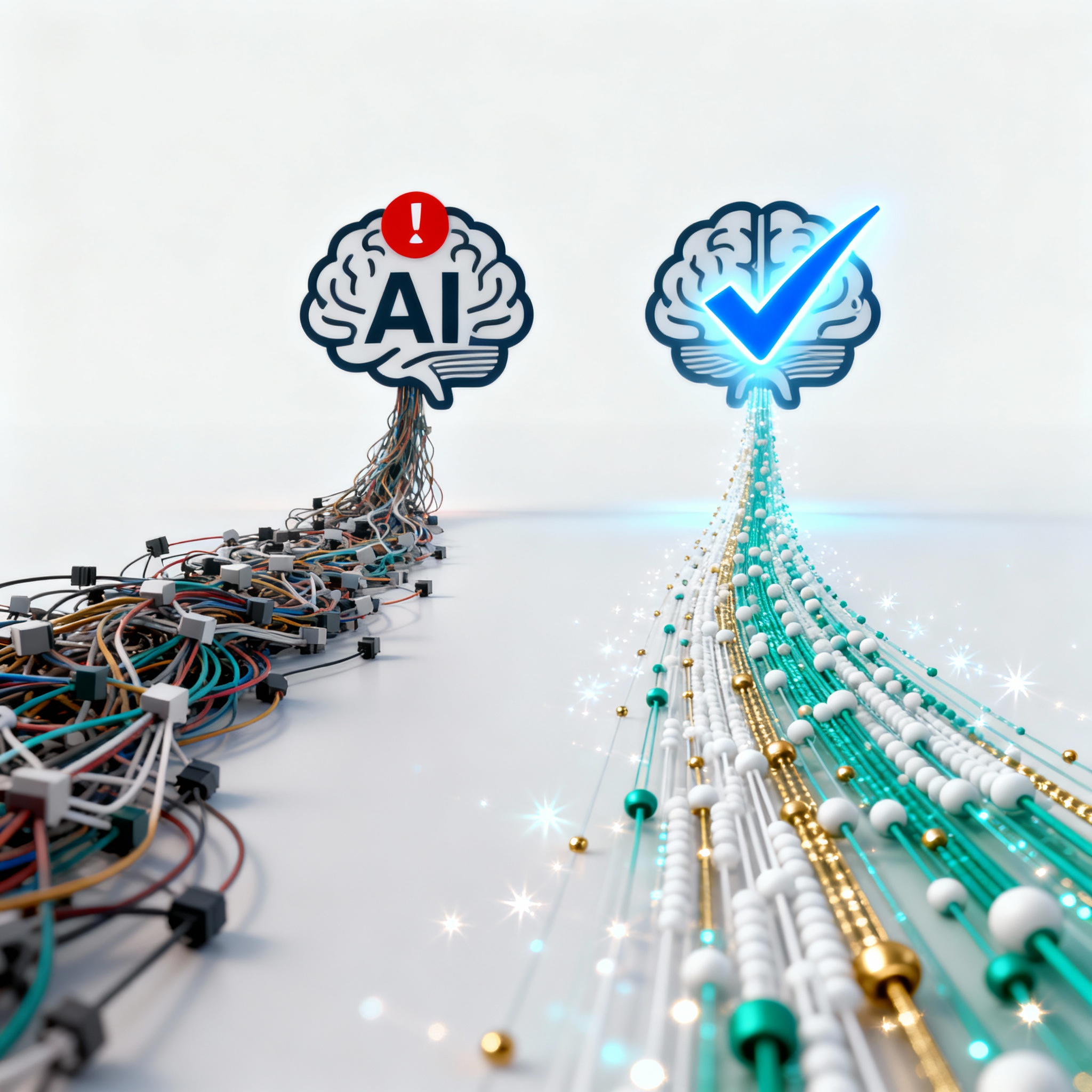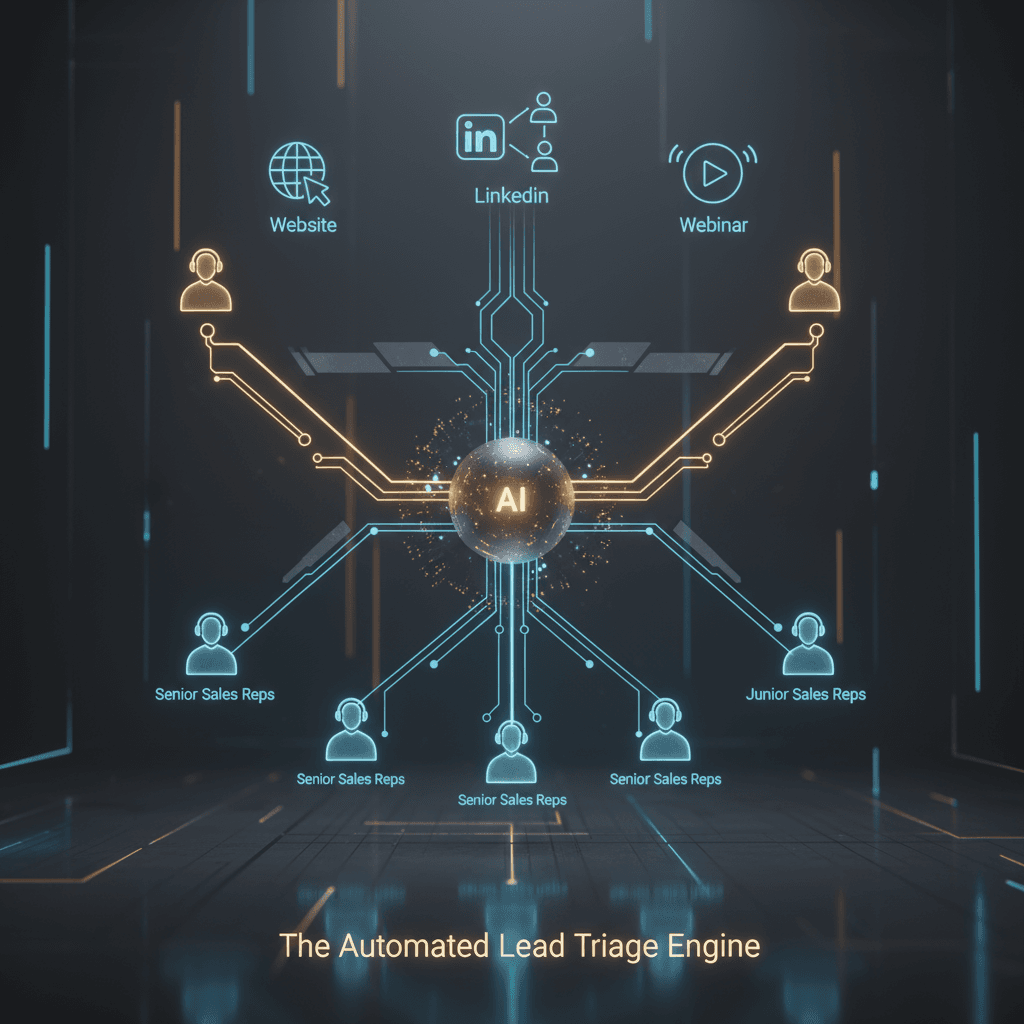The “Single Source of Truth” Framework: How to Prepare Your HubSpot/Salesforce CRM for a High-Performing AI Sales Agent
Your AI sales agent is underperforming, and your messy CRM is the likely culprit. This article gives you a step-by-step framework to clean, standardize, and automate your HubSpot or Salesforce data. Stop wasting AI potential and start closing more deals with a reliable "Single Source of Truth."
Your AI Agent Is An Expensive Intern If Your Data Is Wrong
You’ve invested in building an AI sales agent, expecting it to qualify leads and book demos 24/7. But the results are underwhelming. Demos are booked with the wrong people, outreach feels generic, and your human team spends more time fixing AI errors than selling. The problem isn't the agent; it's the data it's feeding on. A powerful AI running on messy, duplicated, and outdated CRM data is like a Formula 1 car trying to race on a muddy field—all potential, no performance.
This guide provides a practical framework to fix the root cause. We'll show you how to audit, clean, and automate your CRM hygiene to create a "Single Source of Truth" (SSoT). The outcome? Your AI agent transforms from a liability into a high-performing team member that drives measurable pipeline growth.
Key Takeaways:
- Stop Data Chaos: Learn to establish a "Single Source of Truth" in your CRM, ensuring your AI agent always works with accurate, reliable information.
- Actionable Cleaning Checklist: Get a step-by-step process to de-duplicate, validate, standardize, and enrich your existing HubSpot or Salesforce data.
- Automate for Good: Discover how to use tools like n8n or Make.com to build simple workflows that maintain data hygiene automatically, saving your team hours each week.
- Boost AI Performance: See how clean data directly translates to better AI-driven conversations, higher lead qualification rates, and a tangible increase in booked demos.
- UAE-Specific Insights: Get practical tips for handling unique data challenges in the Dubai market, from phone number formatting to common name variations.
Why Your AI Sales Agent Is Only as Smart as Your CRM Data
The principle of "Garbage In, Garbage Out" (GIGO) is old, but it's dangerously relevant for AI. An AI sales agent can't intuit that "Mo Salah" and "Mohamed Salah F&H" are the same person, or that a contact who left their company a year ago shouldn't be pitched. It operates on the data you provide, with no room for error. When that data is flawed, the consequences are immediate.
Imagine your AI agent reaches out to a high-value lead using an old job title. At best, it's embarrassing. At worst, it’s a lost opportunity. Before implementing a data hygiene program, one of our clients found that 15% of their AI's outreach was hitting outdated contacts. After our cleanup and automation process, that error rate dropped to less than 1%, and their demo bookings from the AI agent jumped 22% in 30 days.

The Single Source of Truth (SSoT) Framework
A Single Source of Truth doesn't mean all your data lives in one place. It means you have one *master record* for each contact or company that is recognized as the most accurate and up-to-date. This is the record your AI and your sales team must trust and use. Building it involves three key steps.
Step 1: Map Your Data Flow
First, you need to understand how data enters your CRM. Is it from website forms, manual imports, third-party integrations like LinkedIn Sales Navigator, or all of the above? Audit every entry point. This helps you identify where messy data originates so you can plug the gaps. For instance, if a webinar integration is creating contacts with no last names, you know exactly where to enforce a new data validation rule.
Step 2: Define Your Core Properties
Not all data fields are created equal. Your AI agent needs a specific set of information to do its job effectively. Work with your team to define the absolute minimum, non-negotiable data points required for a lead to be considered "AI-ready." Everything else is secondary.
| Property | Example | Why It Matters for AI |
|---|---|---|
| First Name | Fatima | Enables personalized greetings. |
| Last Name | Al-Mansoori | Helps avoid duplicates and ensures formality. |
| Verified Business Email | fatima.a@company.ae | Primary channel for sequences and meeting invites. |
| Formatted Mobile Number | +971501234567 | Critical for WhatsApp communication and calls. |
| Lead Status | AI Qualified | Tells the AI when to engage or disengage. |
| Company Name | Global Innovations LLC | Provides context for industry-specific outreach. |
Step 3: Implement Data Validation Rules
Once you know your essential fields, enforce their presence and format. Use the built-in tools in HubSpot or Salesforce to make certain fields mandatory. For contact information, integrate a third-party validation tool. Services like NeverBounce or ZeroBounce can verify email addresses in real-time as they enter your system, drastically reducing bounce rates and protecting your domain reputation.
A Practical Checklist for Your Initial CRM Data Cleanse
Before you can automate, you need a clean slate. This initial cleanup is a project, not a daily task. Block out time and work through these steps methodically.
- De-duplicate Mercilessly: Use your CRM's built-in merge tools to find and consolidate duplicate contacts and companies. Start with email addresses, then move to names and company domains.
- Validate Contact Info: Export your contact list and run it through a bulk email verification service. Do the same for phone numbers if possible. Tag or delete invalid entries.
- Standardize Everything: Inconsistent formatting confuses AIs. Create a standard format for job titles (e.g., "Chief Executive Officer" instead of "CEO"), country names ("United Arab Emirates" not "UAE"), and especially phone numbers (always include the country code, like +971).
- Enrich Missing Gaps: Identify high-value leads with incomplete profiles. Use tools or manual research to find missing information like company size, industry, or job title. This fuels better lead scoring and personalization.
- Archive the Irrelevant: Be honest about the contacts you'll never do business with. Create an archival process for leads that are unresponsive, unqualified, or have left their company. This reduces noise and lets your AI focus on active opportunities. Knowing how to build an AI workforce starts with giving it clean data to work with.

Automating Data Hygiene with n8n or Make.com
A one-time cleanup is great, but entropy is relentless. New, messy data will start trickling in tomorrow. The only sustainable solution is to automate your data hygiene rules. This is where low-code platforms like n8n and Make.com are invaluable.
Instead of relying on your team to manually format new leads, you can build a simple workflow that does it for them. For example:
Workflow: New Lead Standardization
- Trigger: A new contact is created in HubSpot.
- Step 1: The email address is sent to the ZeroBounce API to verify it's valid.
- Step 2: The phone number field is checked and automatically formatted to include the `+971` prefix if missing.
- Step 3: The company name is cross-referenced to ensure no duplicate company record is created.
- Step 4: The contact record is updated with the clean, validated data.
This single automation can prevent thousands of bad records from entering your CRM over a year. Building these workflows frees up your operations team from manual data entry—one client saved over 5 hours per week—and ensures your AI agent has a steady stream of high-quality leads to work with. These are the kinds of operational efficiencies that define who Future & Happiness is and the value we bring to our clients.

UAE-Specific Data Considerations
Operating in Dubai and the wider UAE presents unique data challenges. A generic approach to data cleaning will miss local nuances. Pay special attention to:
- Name Variations: Names can be spelled multiple ways transliterated into English. Implement a "fuzzy matching" logic when de-duplicating to catch variations.
- Multiple Mobile Numbers: It's common for professionals to have more than one mobile number. Your CRM should have a primary mobile field but also allow for a secondary one.
- PO Boxes vs. Physical Addresses: For many businesses, the PO Box is the official address. Ensure your CRM can distinguish between a physical location and a mailing address.
- Phone Number Formatting: The `+971` country code is often dropped, and local numbers can start with `050`, `052`, `055`, etc. Your standardization workflow must be able to handle these variations and format them correctly.
Frequently Asked Questions
- How do I clean my CRM data for AI?
- Follow a 5-step process: 1) De-duplicate contacts and companies. 2) Validate emails and phone numbers. 3) Standardize formatting for names, titles, and numbers. 4) Enrich records with missing data. 5) Archive old, irrelevant contacts.
- What are the minimum data requirements for an AI sales agent?
- At a minimum, an AI agent needs an accurate First Name, Last Name, verified business Email, a correctly formatted Mobile Number (for WhatsApp), and a clear Lead Status to function effectively.
- How can I automate data entry in my CRM?
- Use tools like n8n or Make.com to connect your lead sources (e.g., web forms) to your CRM. Build workflows that automatically validate, format, and standardize data before creating a new contact record.
- What are the best practices for CRM data management?
- The best practice is to establish a "Single Source of Truth." This involves defining data ownership, enforcing mandatory fields, regularly cleaning the existing database, and automating hygiene for all new data entry points.
- How do I prevent duplicate contacts in HubSpot or Salesforce?
- Start by using the native duplicate detection tools in your CRM. For a more robust solution, create automation rules that check for existing contacts based on email AND phone number before creating a new one. Always merge, don't delete.
- What are common data problems that affect AI sales agents?
- The most common issues are duplicate records, invalid email addresses, unformatted phone numbers, outdated job titles or company information, and inconsistent lead status definitions.
Your Action Plan: From Data Chaos to AI-Ready in 4 Steps
Fixing your CRM data isn't just a janitorial task; it's a strategic imperative for getting real value from your investment in AI. A clean, reliable CRM is the central nervous system of your sales and marketing operation. Here’s how to get started today:
- Schedule a 1-Hour Data Audit. Use the checklist in this article to get a baseline score of your current data health. Identify your biggest problem area—is it duplicates, invalid emails, or something else?
- Define Your SSoT and Core Properties. Get key stakeholders together and agree on the essential data fields your AI and sales team need to succeed. Document these standards.
- Execute Your First Data Cleanse. Dedicate a "sprint" to work through the validation, standardization, and de-duplication process. Aim for progress, not perfection.
- Build Your First Data Hygiene Automation. Pick your most problematic lead source and build a simple n8n or Make.com workflow to clean the data as it comes in. This is your first line of defense against future mess.



